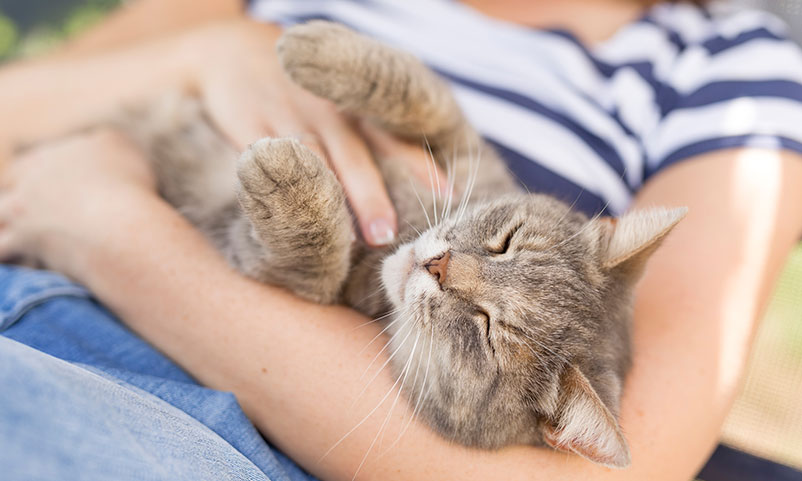Our kittens are our best cuddlers and companions, and we want them purring and content year round! Unfortunately, as
seasons shift, allergies can get in the way — just like with hoomans.
There’s nothing more heartbreaking than a wheezing or uncomfortable kitten, but allergies are actually one of the
most common medical conditions that affects cats, according to VCA Animal Hospital. So what do allergies in cats
look like? And how do we get our feline friends back to their loving and playful selves?
Here’s what you need to know about allergies in cats, including common symptoms and how to treat them.
What Are Common Allergy Symptoms In Cats?
We all know what allergies look like in hoomans, but what are the symptoms for our furry friends? Here are a few of the most common allergy symptoms in cats:
- Itching skin, either in one area or all over the body
- Excessive grooming or biting
- Coughing and sneezing
- Wheezing or unusual snoring
- Nasal/eye discharge
- Vomiting
- Flatulence or diarrhea
- Excessive hairballs
Pet parent tip: If your cat’s increase in hairballs is paired with thinning fur or red spots, it’s possible allergies are to blame! Excessive hairballs can cause long-term gastro-intestinal damage. Consider using Hairball Support Plus or a similar product to eliminate and prevent hairballs.
What Is My Cat Allergic To?

The only surefire way to answer this question is to take your feline friend to a trusted vet! A doctor who has a
relationship with your fur baby can help you discover the cause of your kitty’s allergies.
There are three types of allergies your cat might have: environmental, flea or food.
Environmental Allergies
This type of sensitivity occurs when your fur baby is reacting to pollens, molds, house dust mites, ragweed or other
environmental factors. And, yes, that includes seasonal allergies! Just like us
hoomans, your cat is particularly
vulnerable to allergies in the spring.
If your fur baby consistently gets itchy in just the summer or develops an allergy after a household leak, they
might have an environmental allergy.
Flea Allergies
Alternately, your cat may be experiencing flea allergies. While flea bites irritate and cause itching in most cats,
some fur babies are extremely allergic to flea bites. It can cause intense itching and skin discomfort, as well as
vomiting and diarrhea in a few cases.
The best way to protect your fur baby from flea allergies is to use flea prevention.
Look for all-natural flea and
tick sprays that do not contain cedar oils or pyrethrins; those ingredients can be damaging to your cat.
Food Allergies
The third type of allergy occurs when your cat is allergic to something they’re consuming — whether that’s food,
treats or seasonings. These allergies are unique to each cat and can be hard to diagnose, but your vet can help you
figure out the culprit!
The good news is that once you determine what your cat is allergic to, your fur baby’s health will immediately
improve. They’ll be purring and happily making biscuits in no time!
How Do I Treat Allergies In Cats?

As fellow pet parents, we know your cat’s health and happiness is everything to you. Treating your cat’s allergies
will make them feel a whole lot better — and happier as a result!
In order to treat your cat’s sensitivities, a vet visit is in order. A trusted veterinarian can help you figure out
the source of your fur baby’s discomfort and how to properly treat the issue.
Allergy symptoms, however, can be treated immediately and from home! We recommend giving your fur baby a complete
allergy supplement — preferably one that boosts the body’s natural ability to combat issues associated with
sensitivities. It’s especially important that the supplement helps reduce body heat and drains phlegm. (This helps
out with itching!)
We also recommend adding salmon oil to your kitten’s health routine! Salmon oil is a superb way to soothe itchy skin
and optimize coat health, thanks to its rich helpings of Omega-3 and Omega-6 fatty acids. Lastly, use an ear wash to
support those itchy and inflamed ears! Your cat will be so much happier for it.
PawTree’s allergy solutions set contains Allergy Support Plus supplements, Salmon &
Pollock Oil, and an Ear Wash
set, so your kitten can be a whole lot more comfortable during allergy season.
Allergies don’t need to be a pain! With the right information, advice from a trusted vet, and a few natural
treatments, you and your kitten will be cuddling up itch-free in no time.
You Might Also Like

3 Spring Salmon Oil Recipes for Dogs and Cats Read More |

Say Goodbye To Fleas: A 3-Step Solution For A Healthy Pet And A Clean Home Read More |

3 Ways Pets Can Relieve Stress Read More |

3 Spring Salmon Oil Recipes for Dogs and Cats
Say Goodbye To Fleas: A 3-Step Solution For A Healthy Pet And A Clean Home
3 Ways Pets Can Relieve Stress


.jpg)

